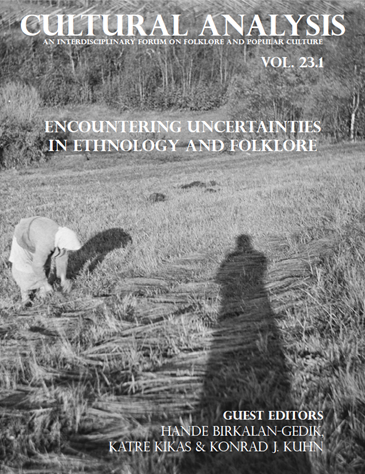
SIEF Journals
Upcoming: Cultural Analysis 23.1 (2025) & Ethnologia Europaea 55.1 (2025)
Volume 23.1 (2025): Encountering Uncertainties in Ethnology and Folklore
Guest Editors: Hande Birkalan-Gedik, Katre Kikas, Konrad J. Kuhn
This special issue, Encountering Uncertainties in Ethnology and Folklore: Actors – Milieus – Strategies, presents papers dealing with uncertainties in fieldwork and archives. The issue explores lessons to take from our disciplinary pasts dealing with different uncertainties and their implications for our disciplinary futures. The contributors aim to look at the notion of “uncertainties” from the perspectives of involved actors, exploring the social, political, and disciplinary milieus in which they worked or operated, and presenting their strategies to overcome or navigate the problems they faced. This issue takes up our collegial conversations, having taken place at the SIEF 2023 Conference in Brno, Czech Republic, at the panel organized in the context of the Working Group “Historical Approaches to Cultural Analysis,” which explored different contexts of uncertainties in the disciplinary pasts of ethnology and folklore and their implications for disciplinary futures.
Contents:
Hande Birkalan-Gedik, Katre Kikas, Konrad J. Kuhn:
Encountering Uncertainties in Ethnology and Folklore: Actors – Milieus – Strategies. An Introduction
Hande Birkalan-Gedik:
Fieldwork in Times of Uncertainty: Hayrünnisa Boratav, Pertev Naili Boratav, and Their Collaboration in Folklore
Katre Kikas:
Uncertainties of Modernity and the Folklore Collectors in the Last Decade of the Nineteenth Century Estonia
Sanna Kähkönen:
“Following the Victors”? Uncertainties in Defining the Societal Influence of Ethnological Knowledge in Wartime Finland, 1941–1944
Ave Goršič:
Uncertainties in the early 1990s for Estonian folkloristics and the Estonian Folklore Archives
Kelly Fitzgerald:
The Irish Folklore Commission and the Irish Civil War: Uncertainties in Silence (1923-1935)
About the Journal
Cultural Analysis is an interdisciplinary, peer-reviewed, open-access journal dedicated to investigating expressive and everyday culture. The journal features analytical research articles, reviews, and cross-disciplinary responses. Established in 2000 in the Berkeley Folklore Archives, Cultural Analysis has published 22 volumes and hosts a global editorial board and collective.
Ethnologia Europaea 55.1
The upcoming issue features three articles; an ethnographic snapshot and two in memoriam appreciations. It is not a special issue, but readers will quickly identify the strong Nordic content within these pages. Thematically, some readers might feel that hybridity is equally back in the centre ring as a significant conceptual harmoniser.
Hence, it is perhaps fitting to lead with a piece on the state of affairs within academia. Tiina Suopajärvi writes about the neoliberal affects on the senses of optimism and pessimism within the Finnish higher education scene. Her article, nonetheless calling for solidarity, offers methodological experimentation in the post-Covid19 era of hybrid scholastic encounters, revealing how feelings of alienation and exploitation often run ripe.
Then we have a ritualised duo-auto-ethnography of sorts by Anna Storm and Florence Fröhlig. Their article explores the safety protocols performed during visits through the liminal space of a nuclear power station in Sweden.
Helena Laukkoski’s study provides a kind of comparison of the collections collaboration between the Finnish National Museum and the ‘now closed’ Fame Music Museum. Her framework explicitly addresses ideas of hybridity.
This issue also features an ethnographic snapshot by Carin Graminius and Simon Halberg on small-hold farming in the world of agribusiness. Here we get a glimpse into the hybrid amalgamations of how human labour can become intertwined with AI and other big machine technologies.
Both as a celebration and with regrets, this issue includes two appreciation pieces to the lifework of a pair of notable anthropologists who were based in Olso – Professors Signe Howell and Thomas Hylland Eriksen. The latter includes commentaries by friends, students, and colleagues whose lives they touched, and whose research paths were heavily impacted by their guidance.
By publishing these extensive collaborative praise pieces (subsequently to a recent tribute for Chris Tilley), it is not our intention to turn EE into the obituary pages for the cognate fields of Cultural Analysis, Ethnology, Folklore or Cultural and Social Anthropology. Yet these recent deaths of significant contributors to cultural theory in various European contexts have deserved special acknowledgements. And even though it is not new to have jointly written praise for the influence of our mentors, we feel this is a fitting format for EE.
This is reminiscent of the Anthropology Today commemorative appreciation for Raymond Firth nearly a quarter of a century ago (Macdonald et al. 2002). With such a precedent, Sharam Alghasi’s comments on the career of his close friend Thomas Hylland Eriksen is an apt preface to both appreciations since he points to the idea of We vs. Others. “We” thus encourage additional group commemoration commentaries in the future. This seems to be a fitting way to celebrate the diversity of influence from those who have helped shape current generations of ethnologists into navigating the complexities of archival, field research, and social theory in the twenty-first century.
References
Macdonald, Judith, Rima A. Bartlett, Stephan Feuchtwang 2002: Obituary: Appreciations of Sir Raymond Firth. Anthropology Today, 18, no. 5: 20-23.
EE is a part of the Berghahn Open Anthro subscribe-to-open Collection:
https://www.berghahnjournals.com/page/berghahn-open-anthro
Please support the Subscribe-to-Open initiative and recommend EE to your institution's library by filling out this one-step web form: https://ee.berghahnjournals.com/library-recommendation
Patrick Laviolette and Alexandra Schwell




